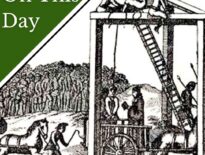On or around 10th January 1603, in the reign of Queen Elizabeth I, Arthur Dent died of a fever. The religious writer, Puritan and clergyman had made his will three days earlier.
Arthur Dent's works included his "Sermon of Repentance", "The Ruine of Rome, or, An Exposition upon the Whole Revelation", and "The Plaine-Mans Pathway to Heaven", which was very popular and had reached its 25th edition by 1640 and its 41st by 1831. It influenced John Bunyan's "Pilgrim's Progress" and Richard Baxter's "The Poor Man's Family Book".
Ezekiel Culverwell wrote of Dent's death:
"His life was not more profitable to others, than his death was peaceable to himself: scarcely a groan was heard, though his fever must have been violent, which despatched him in three days. Having made a pithy confession of his faith, 'This faith,' said he, 'have I preached; this faith have I believed in; this faith I do die in; and this faith would I have sealed with my blood, if God had so thought good; and tell my brethren so.' He afterwards said, 'I have fought a good fight, I have finished my course, I have kept the faith; henceforth there is laid up for me the crown of righteousness:' and, with his last breath, added, 'I have seen an end of all perfection, but thy law is exceeding broad."
Of course, the name Arthur Dent is better known as the protagonist of Douglas Adams' novel, "The Hitchhiker’s Guide to the Galaxy", which seems rather similar to "The Plaine-Mans Pathway to Heaven", but apparently is just coincidental. Adams stated that he had never heard of Dent's work.
You can read Arthur Dent's work "The Plaine-Man's Pathway to Heaven" online at https://archive.org/details/plainmanspathway00dentuoft



Leave a Reply